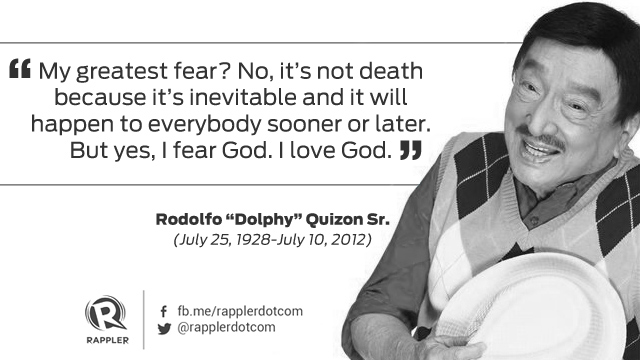SUMMARY
This is AI generated summarization, which may have errors. For context, always refer to the full article.

A year ago on July 10, the King of Comedy passed away, and so today, the nation fondly remembers Dolphy.
Rodolfo Vera Quizon crossed The Great Beyond a few days short of turning 84 on July 25.
All the 83 years on this planet were as full a life as one can have, imparting to his country’s art and culture (not only pop culture) a great legacy of comedy with a touch of sentiment drawn from Charlie Chaplin. He was our Charlot. He was, more important, the great model of our unique comedy – a distinction he himself would belittle with characteristic humility.
READ: Dolphy’s burial: The final goodbye
Dolphy’s autobiography, the aptly titled “Dolphy: Hindi Ko Ito Narating Mag-isa,” is an honest book, without any pretensions at wit, and it doesn’t even beg for recognition in the book design category.
The book is co-written by screenwriter, actress and director Bibeth Orteza, who counts among not a few in the entertainment community with distinct memories of the man.
Dolphy’s preface is by itself a hallmark of candor. He said the book is dedicated to those who followed his career and to those who laughed and cried with him.
“If I have offended you one way or another, my apologies. If you thought you offended me, I forgive you. I offer my life story to the OFWs because like them, I know how it felt to be separated from family and to make a big sacrifice for the sake of family. Read the story of my life and I hope my life story gives you joy and lesson as well.”
The book is definitely a winner, as it recounts eight glorious, fascinating decades of a life that may well represent much of our country’s entertainment history.
For Orteza, Dolphy was part of four decades of her life. She grew up being entertained by the comedy king on radio and TV, before the advent of cable television.
Then she encountered his old films like “Jack and Jill,” “Isang Sulyap Mo Tita,” and “Dalagang Ilocano” at the cinemas during the heyday of this since-transformed institution – at the Rainbow Theater in San Juan, the Embassy Theater in Sta. Mesa, the Cine Moderno in Bustillos, Sampaloc, and Cine Kamuning in Quezon City.
The book project first came up some eight years ago, before Orteza’s own ordeal with cancer.
It took five months for the live interviews and back and forth by mobile messages. The interviews would end in the dead of night. Between writing and interviewing, she gave birth to a baby boy whom she didn’t name, however, after Dolphy, as she related this to the comedian: “I didn’t name him Rodolfo. He might end up making women cry.”
The name she gave her son made Dolphy laugh – Vic, after another popular comedian.
On the whole, the book is a candid, admirable portrait of an entertainer who had nothing to hide. The women in his life are fondly remembered in this book, and his children by them, along with his early struggles, taking assorted jobs to support his family.
He was especially open about Lotis Key, as he was about Pilar Pilapil, with whom he remembers watching the play, “Oh, Calcutta,” in Broadway. With him and Pilar were the latter’s mother and Nida Blanca and they were seated on the same row as Hollywood actress Frances Nguyen.
Dolphy recounted the nude scenes in the musical, including the autoerotic scene where Pilar’s mother would shriek, “Sus Ginoo!“
He was open about his sex life as well, from his early youth to his overseas flings. In a chapter called “Unang Tikim,” he recalled his initiation into sex at the age of 13, courtesy of a hospitality girl at a Paco nightclub.
Dolphy’s life had its abundant share of drama, along with the comedy. He was rather honest about his weaknesses as a human being. In this book, you see a loving father and grandfather and, in his own way, a dedicated lover. It is a great irony in his life that this generous man who raised such a large family never got married.
Randy David’s foreword sums up Dolphy’s autobiography not just as a life story but also as a vivid chronicle of our country’s entertainment and culture: “The life of Dolphy is a mirror of a time long gone. He went through it all and in the process learned how it is to share and to forgive. If we get to understand Dolphy’s life, it is possible we will get to know ourselves better.”
The inscription on his tomb reads quite simply: “Rodolfo Vera Quizon Dolphy ‘King of Comedy’ July 25, 1928-July 10, 2012.” – Rappler.com
Add a comment
How does this make you feel?
There are no comments yet. Add your comment to start the conversation.